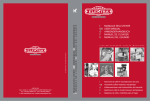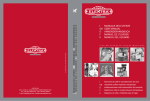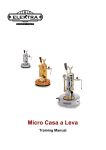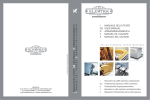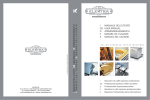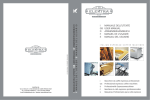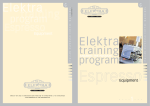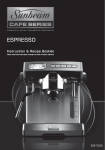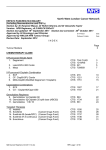Download ELEKTRA ITALIAN ESPRESSO COFFEE MACHINES Specifications
Transcript
M A C H I N E S AD: Holbein & Partners - Edition January 2006 C O F F E E E S P R E S S O Elektra training manual I T A L I A N I T A L I A N E S P R E S S O Miniverticale M A C H I N E S manual C O F F E E Elektra SHARING THE PASSION Miniverticale Elektra srl - Via A. Volta, 18 - 31030 Dosson di Casier ( Treviso ) Italy - Tel. +39.0422.490.405 r.a. - Fax +39.0422.490.620 E-mail: [email protected] - Web: www.elektrasrl.com b o o k 7 s e v e n CONTENTS 1.Overview 1.OVERVIEW Models 3 Specifications 3 Features 3 Available accessories 3 2.Package contents 4 3.Mini verticale parts 5 4.Assembly 6 Models Available in three versions: 1. A1 Copper and brass machine, brown wood base 2. A1C Chrome machine and black wood base 1. Specifications 5.Operating instructions 6.Making coffee 7 Working the machine 8 Making coffee 8 Features Weight 13 kg Tank capacity 2 litres Height 69 cm Base Diameter 26 cm 2. 1. Electric pump and boiler 2. Commercial size group head and handle 9 7.Frothing or heating milk 3. Drainable drip tray 4. Cup warmer 8.Maintenance and cleaning Daily 10 Weekly 10 9.Background information Operating principles 11 The group head 11 Available accessories 1. Coffee grinders, two models: 2. Cups, two types: TC (Cappuccino – Ivory) Chrome finish (model MSC) Copper and brass finish (model MS) 02 03 TE (Espresso – Ivory) 3. Cleaning brush (SPA) 2.PACKAGE CONTENTS 3.MINI VERTICALE PARTS eagle spacer water tank cover Micro casa mini verticale espresso coffee machine Instruction manual with guarantee card brass bolt Water tank cover Decorative handle parts water tank bolt for attaching water tank Wooden base Brass or chrome drip tray cover cup warming compartment element indicator light coffee extraction button steam button power indicator light Water tank and holding bolt Metal drip tray steam tap on/off switch group head steam wand filter basket Coffee handle Single and double filter baskets drip tray cover drip tray (metal) coffee handle Dosing spoon Tamper wooden base 04 05 4.ASSEMBLY 5.OPERATING INSTRUCTIONS 1. Place decorative timber base onto bench. 1. Remove water tank cover and fill water tank with fresh, cold water. (For best results use filtered or bottled water.) Replace water tank cover. 2. Place machine onto base so the power lead sits in the slot cut into the base. 2. Connect the electrical plug to a suitable 240V power outlet. 3. Attach water tank onto top support bracket and connect water hose. 3. Switch on power outlet, then switch on the machine at its power switch. Both indicator lamps should light. See photos below. water tank hose connection point water hose support bracket indicator lamps off green spot Power switch off (out position) 4. Immediately press the coffee extraction button to activate pump and fill boiler from water tank. Release button when water starts flowing through the coffee handle. 4. If supplied, connect the plastic drain hose to the outlet on the metal drip tray. Lay the drain hose in the slot in the wooden base. Run the tube to a bucket or suitable drainage point. 5. Place chrome/brass drip tray cover onto drip tray. The cover should be placed so the copper drain tube locates into the large hole in the drip tray cover. 6. Place a filter basket into the coffee handle. 7. Attach coffee handle to group head. copper drain tube indicator lamps on orange spot Power switch on (in position) 5. After about five minutes, the boiler element lamp will go out, indicating the boiler is up to its correct pressure. power indicator, always on when on-off switch is on Operate coffee extraction button until water starts flowing hole in drip tray cover 8. Attach eagle onto water tank cover and place cover into position. Boiler water level – it’s essential to ensure the boiler is never allowed to run dry as the heating element will burn out. Make sure the water tank is at least half full at all times. Also always perform step 4 above when the machine is first switched on. 06 07 element on indicator, on when boiler is heating 6. Press the coffee brewing pushbutton and run half a cup of water through the group head into a cup. Although the machine is now at the correct pressure it’s important to work the machine to get it to the correct operating temperature. See next page. 6.MAKING COFFEE Working the machine 1. Press the steam button. 2. When the element indicator light goes out, insert steam wand into a jug half filled with cold water. Turn on the steam tap and heat the water until it’s nearly boiling. Switch off steam button and empty the jug. 7.FROTHING OR HEATING MILK element indicator light Froth or heat milk before making coffee. This ensures the boiler is at the optimum temperature and pressure to make coffee. element indicator light steam button To froth or heat milk: steam button 1. Press the steam button. This will usually cause the element indicator lamp to light. steam tap 2. When the lamp goes out, turn the steam tap anticlockwise to purge the steam wand of condensation by releasing steam into a container. 3. Place empty jug under steam wand and turn steam tap on. 4. Press the coffee brewing button until a continual stream of water flows from the steam wand into the jug. 5. When the light goes out, press the coffee brewing button to run about 30mls of water through the group head into a cup. Making coffee The machine is ready when water from the group head hisses with steam. Remove the handle to check. Return it to the group head to keep it warm. If necessary repeat the above steps. 4mm 1. Remove coffee handle from the machine and: • To make a single cup — with the single cup filter basket fitted to the handle, add one rounded espresso dosing spoon of coffee grounds to the basket, and tamp down firmly. • To make a double cup — with the double cup filter basket fitted to the handle, add a level espresso dosing spoon of coffee grounds to the filter basket and tamp down firmly. Add another level dosing spoon of coffee grounds and tamp firmly. 2. Wipe off excess coffee grounds from the rim of the filter basket and fit the coffee handle securely into the group head by pulling the handle horizontally to the right. If too high, the handle won’t fit into the group head. In all cases, the tamped coffee grounds should be around 4mm from the top of the filter basket. 4. Remove the handle by carefully pulling it horizontally to the left. 5. Dump the used coffee cake into dumping box or by tapping the coffee handle on a non-metal surface. 6. Rinse the handle/basket and return to the group head. Note: • 3. Place coffee cup(s) onto metal drip tray. Press the coffee brewing button and extract coffee to the required level. Press the button again to stop coffee flow. Then remove cups from drip tray. 08 steam tap It normally takes 25–35 seconds to extract a shot of coffee. • When the coffee brewing button is turned off, an electric solenoid valve operates to release the pressure inside the group head. This also has the benefit of extracting the remaining water from the coffee cake. The water is expelled into the drip tray, so you need to regularly empty this tray. 3. Fill a stainless steel jug with the required amount of milk. Avoid filling jug more than half way. 4. Immerse the tip of the steam wand into the centre of the jug, just below the surface of the milk. 5. Turn on the steam tap anticlockwise until you hear a soft “psst-psst” sound, which indicates the milk is being frothed. As the milk level rises, lower the jug to ensure the wand stays just under the surface of the milk to maintain the “psst-psst” sound. 6. When the milk is sufficiently frothed, lower the steam wand into the milk to heat it. Move the wand around the milk to ensure even heating. Do not boil the milk! Correct temperature can be judged by holding your hand against the jug. When the temperature is too hot to the touch, wait four seconds or so, then turn off the steam. 7. Remove the jug and top up the boiler water level. To do this: • Insert the steam wand into an empty jug and open the steam tap. • Press the coffee extraction button until a continual stream 09 of water flows through the steam wand, indicating the boiler is full. This will also flush out any milk deposits inside the wand. • Wipe the steam wand with a clean damp cloth to remove any milk before it dries. 8.MAINTENANCE AND CLEANING Daily 1. Use a clean sponge, cloth or brush to clean the shower head and up inside the group head. 9.BACKGROUND INFORMATION Looking into the group head. Clean all parts, including the rubber sealing ring and the surface of the shower head. Operating principles group head rubber sealing ring 2. Flush a small amount of water through the group head. 3. Place a small jug of cold water under the steam wand and release steam to remove any milk deposits from the wand. 4. Wipe the surface of the wand with a soft damp cloth, including all grooves or places where milk could build up. Do not use any alcohol, solvent or abrasive creams or cloths on the surface of the machine. Weekly • With commercial espresso machine cleaning chemical 1. Put three teaspoons of cleaning chemical into half a litre of very hot water. 2. Place coffee baskets and handle into the solution to soak for 20 to 30 minutes. Ensure that the bakelite part of the handle is not immersed in the solution. The Elektra micro casa mini verticale has features normally only found on a commercial espresso machine. When the coffee brewing pushbutton is pressed, water is pumped from the boiler into the group head and through the coffee grounds into the cup. During this process, water is pumped from the water tank into the boiler. Correct pressure and temperature are maintained automatically. When the boiler is heating, the element indicator lamp is on. Steam is produced in the boiler by operating the steam button to cause the boiler element to come on. Note that sometimes it is not necessary to operate the steam button, as the boiler pressure and temperature will be high enough to produce steam. The coffee handle fits into the group head, with water flowing through a “shower screen”, as below. If the basket is too full, the grounds will press against the shower screen, stopping the handle from being fitted to the group head. Coffee handle and group head. shower head 5. Remove filter baskets from coffee handle and wash in warm soapy water. Rinse them thoroughly under hot running water. 6. Remove the drip tray cover and drip tray and wash them in warm soapy water. 7. Use a clean, wet paper towel or soft cloth to remove marks from the surface of the machine (while warm) and polish with a clean, dry soft paper towel or soft cloth. The group head The coffee handle has two lugs either side that locate into two slots in the group head. The handle is fitted by aligning the lugs and slots, then pushing the handle up so it can be twisted to the right. When the coffee handle is fitted into the group head, a rubber ring inside the group head seals against the top of the filter basket. It’s therefore important to make sure the top of the filter basket is clean and free of coffee grounds. Otherwise leakage can occur, and in some cases the rubber seal can become dislodged due to a build-up of coffee grounds behind the seal. 3. Rinse and wash all parts with warm soapy water. 4. Rinse thoroughly in hot water. 10 This machine does not allow the user to extract coffee and froth/heat milk at the same time. 11 Water passes through the shower screen to give an even flow of water through the coffee grounds. shower screen locating lug






